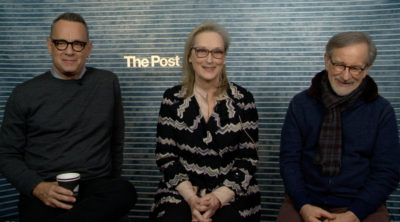
Following famous journalistic films like “Spotlight” and “Citizen Kane,” director Steven Spielberg, actress Meryl Streep and actor Tom Hanks all come together for the first time in “The Post,” which comes to theaters on Dec. 22.
The film retells the story about the partnership between The Washington Post’s Katharine Graham (Streep), the first female publisher of a major U.S. newspaper, and editor Ben Bradlee (Hanks) as they work with The New York Times to reveal a massive cover-up of government secrets — the Pentagon Papers.
The three sat down in a Skype interview last Friday with eight universities around the nation to discuss the upcoming film.
Spielberg said that there was particular historical relevance in the Pentagon Papers, because their contents indicated that the Vietnam War was “unwinnable” while administrations suggested otherwise — it was, according to Spielberg, a “complete lie.”
He added that Nixon had an “authoritarian impulse” to stop the criticisms from the free press by taking legal action and preventing them from publishing the Pentagon Papers, which added to the significance of the movie in this day and age.
In communicating the story now, “I just felt a calling; I think all of us did,” he said, motioning to his colleagues in the Skype call.
“This is a story that is vaguely familiar to all of us in this day and age,” Spielberg said. “Maybe there will be some relevance and there will be some people who will be interested in hearing this story in its own context of 1971 and the Nixon administration.”
In terms of how the current political administration would react, Streep, who had been criticized by President Donald Trump in the past, said that she thinks he would enjoy the movie, but also influence him to change his approach on leadership.
“I actually think he may really like ‘The Post,’ weirdly because it is a great movie and it is a patriotic movie,” Streep said. “And what effect would I hope it would have on him? Well, he would stop the shenanigans and give some respect for people who are operating on their principles and not on their appetite.”
Although the story works in close conjunction to “All the President’s Men” given that both concern the same publication, Spielberg said that he made the effort to make the movie his own.
“I really believed … ‘The Post’ is not really the prequel to ‘All the President’s Men,’” Spielberg said. “I think it’s a stand alone piece of reflective history about how this woman, Katharine Graham, came into her own and found her voice.”
The “bravery and the courage” of Graham, Bradlee and the entire staff of the Post with the Pentagon Papers enabled Bob Woodward and Carl Bernstein to pursue the Watergate scandal two years later, Spielberg said.
To prepare for the role of Katharine Graham, who presided over the Washington Post throughout the Pentagon Papers incident and the Watergate scandal, Streep said she read Graham’s autobiography. Graham spent 16 years researching the work before she published it when she was 79, when it won a Pulitzer Prize.
“What a wonderful woman, what an emblematic life and what a great opportunity to try to give her to the world,” Streep said. “That she would be delivered into this moment in history and have to make a pivotal decision that would affect the entire country and the progress of the government’s attempt to control the press, that her one decision would really direct history in one good direction [adds to the importance of the piece].”
Though the film retells a pivotal moment in U.S. history, Spielberg said he believes it can relate to a more global audience.
“We can no longer think of ourselves as on another hemisphere of the planet,” Spielberg said. “We really now are only one hemisphere and we all have to learn how to figure each other out in order to, you know, get along.”
Not only will “The Post” have an impact in a geographical sense, but also in terms of longevity. Hanks said that he and Streep ensured to put out their best work in the film.
“These scenes are going to last forever whether they’re good or bad,” Hanks said. “You really want to make sure your imprint is on them.”
Kaya Williams contributed to the reporting in this article.














